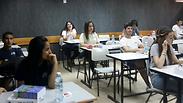
Matriculation exams
New data reveals that an Ashkenazi Jew from central Israel with educated parents has the best chance of succeeding in the psychometric exams (Israeli SATs).
Statistics show that the average results for the psychometric tests rose by three points in 2015 compared to the preceding year. However, the contrast in the grades achieved between boys and girls, between the center and the periphery and between educated families and uneducated families, remains stark.
A report published on Monday morning by the National Institute for Testing and Evaluation (NITE) illustrates that while 2014 saw higher average results in most areas throughout Israel, the conspicuous gaps between central Israel and the periphery remained consistent.
The year 2015 also saw an increase in the number of those examined with a total of 66,261 in eight different languages compared with 64,937 in 2014. Those taking the exams in English achieved the highest average grades (596 out of a possible 800), followed by Hebrew (576), French (524), Italian (518), Portuguese (507), Russian (491), Arabic (477) and finally, Spanish (466).
The data shows that 54.6% of those tested were women, 38.5% were men and 6.9% did not register their gender. The average grade among men was 39 points higher than among women (563 against 524), but the average attained by both were on the decline overall. The NITE emphasized that that this disparity between men’s and women’s results has remained consistent over the years.
It also highlights that the gap between men and women is even narrower when each language is assessed on an individual basis. For example, the gap stood at 33 points among those who took the exams in Hebrew while it is even smaller among Arab-speaking individuals who took the exam which saw a margin of 24 points.
Notably, matriculation exam results illustrate opposite discrepancies with the average grade attained by men and women (without bonus points) in 2015 standing at 86 and 88 (out of a possible 100) respectively.
The psychometric results for Israeli children (with both parents being born in Israel), averaged out in 2015 at 582 in 2015, similar to the average marks achieved by western-born children (with both parents being born in Europe/US/South Africa or only one of the parents being born in these regions and the other being born in Israel).
In 2014, both Israeli-born and western-born children achieved an average of 577. By contrast, the results attained by children born to parents hailing from the east (two parents from Asia/Africa or only one parent born in these regions and the other born in Israel) stood at 559. This notwithstanding, the figure represented an increase from the 553-point average scored in 2014.
When categorized by areas, the gaps between the center of Israel and the periphery remain consistently wide. For example, the average highest grade in 2015 was in Tel Aviv (587), followed by the Gush Dan region (581), the center (574), Hasharon (569), Jerusalem (564), Haifa (528), western Galilee (519), the south (517) and finally, the eastern Galilee (511). The southern region saw an increase of six points since 2014 whereas the eastern Galilee saw a decline by six points.
An evaluation of the average grades indicates a correlation between the level of education of the parents and the results achieved by their children. That is to say, the higher the parents’ education, the higher the results of their children. For example, a child will receive an average grade of 574-613 if his father possesses an undergraduate degree. By contrast, a child whose father does not have a bachelor's degree under his belt received an average score of just 445-553. This pattern, which was also present in 2014, was also recorded when it came to mothers since 2014.
The highest results in 2015 were scored by people aged 22-25, with an average grade of 583. By contrast, the lowest grades were achieved by people over the age of 30 who averaged at 492. Among those examined in Arabic the trend was the opposite. Most of those examined (more than 87%) were younger than 20 with their average score being 480, which was higher than those between the age of 25-30 who scored an average grade of 459 and who make up just 11% of those examined in this language.
The psychometric exams are held five times per year. In 2015, the largest number of examiners took their test in December (19,999) while the lowest number took their tests in February (6,692). The highest average grade in Hebrew was received in December (585) while the lowest was in July (559). The highest average score in Arabic was recorded in September (501) while the lowest was also in July (417).

















